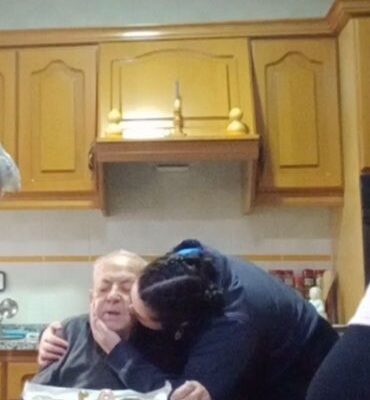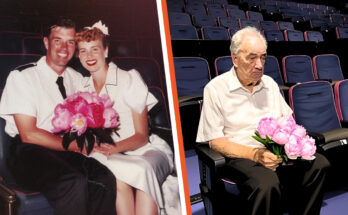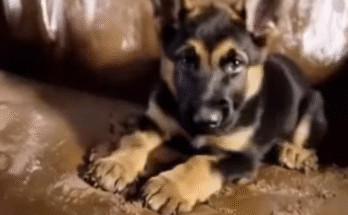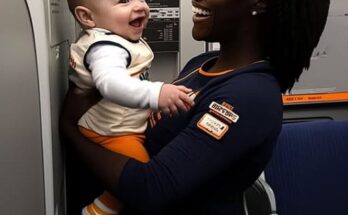Today was my grandfather’s 87th birthday. We did a small thing at my aunt’s house—just close family, some cake, and way too many casseroles. He looked sharp, suit jacket and everything, though his hands were shaking more than usual when he tried to cut the cake.
I’ve always been close with him. He used to pick me up from school in this old beat-up Buick and let me pick the music. So when he asked me to help him back to his room after everyone ate, I didn’t think twice.
His bedroom’s in the back of the house, quiet and kind of dark. He sat down on the edge of the bed, and while he was catching his breath, he pointed to a box in the closet.
“Get that one for me, will you?” he said, voice real low.
I pulled it out—just a plain cardboard box taped shut. He stared at it for a second, then waved his hand. “Open it.”
Inside were photos. Old ones. Some black and white, others faded color prints. But none of them were familiar. Not to me, anyway.
There was a picture of a woman holding a baby—definitely not my grandmother. And letters, all in Spanish. I don’t speak it well, but I recognized a few words. “Amor.” “Siempre.” One envelope had a return address from Puerto Rico and a date: 1982.
I was about to ask him who she was when he shook his head. “Don’t say anything yet. I need to tell you the whole thing first.”
But then my aunt knocked and said it was time for gifts. He looked at me and said, “Later. Just you and me.”
That was five hours ago. Everyone’s gone now. I’m still here, waiting in the kitchen, watching the hallway.
He hasn’t come out yet.
I tried to keep busy by cleaning up the wrapping paper and stacking the leftover casserole dishes. But my mind kept drifting back to that cardboard box. It felt like something massive, a secret that could change the way I saw my grandfather—maybe even change the way I understood our whole family. Was it a hidden love story? A child we never knew about? I had a million questions swirling in my head, and the ticking of the old grandfather clock in the living room wasn’t helping.
Finally, I heard shuffling footsteps. I looked up and saw my grandfather in the hallway. He didn’t have his suit jacket on anymore—just a comfortable sweater draped over his slight shoulders. He motioned for me to follow him back to the bedroom.
He slowly sat on the same spot on the bed, took a deep breath, and then patted the side of the mattress, signaling me to sit next to him. “I owe you an explanation,” he said, words coming out shaky. “About those photos, those letters.”
I nodded, trying to brace myself. “I’m listening.”
He sighed again, pausing like he was sifting through decades of memories. Then he started.
“I was in my early forties when I traveled to Puerto Rico for a work trip,” he said. “I’d been married to your grandmother for more than twenty years by then. She stayed home with your dad and your uncle—” He shook his head like the memory pained him. “I didn’t go looking for trouble. It just…happened.”
He swallowed hard. “I met a woman named Teresa. She was…she was warm, kind. And I thought I was just being friendly. But one thing led to another, and we grew closer. It was a handful of months, that’s all, and it ended as soon as I returned to the States.”
My heart was pounding. “So… the baby? Was that—?”
He nodded, eyes watering. “Yes. He was my son.”
An instant wave of shock hit me, making my stomach flip. A son? So that meant my dad—or my aunt—had a half-brother somewhere. I glanced at the letters again, thinking of the date: 1982. I was born in the early 1990s, so this child would’ve been older than me.
“Your grandmother never knew,” my grandfather continued. “I’m not proud of it. I wrote letters to Teresa for years to stay in touch. In time, though, we drifted apart. She got married to someone else. He treated my son like his own. I thought it was best that way.”
I sat there, stunned, not knowing what to feel. Anger, curiosity, sadness—it all meshed together. “Why keep the letters? Why hide them so carefully if you didn’t stay in contact?”
He wiped at his eyes. “Because you never forget something like that. It’s a part of me, of my life. And even if I wasn’t with Teresa, even if I didn’t get to raise that boy, he was still my blood.”
“But now…why are you telling me?” I asked. “After so many years?”
He looked down at his trembling hands. “I’m old. And I’ve kept it buried all this time. As soon as I started getting letters from him—my son—asking questions, I realized that maybe there’s a chance to make amends or at least be honest before I go. I don’t know what he wants or if he needs closure. But I don’t want to leave this world with something that big unspoken.”
A silence fell between us, broken only by the hum of the air conditioning kicking on. “When did he write to you?” I asked, my voice coming out softer than I expected.
He cleared his throat. “The last letter came about a month ago. He goes by Tomás now—he changed it from Thomas, which is what’s on his birth certificate. He said he’s always known something was off, that his mother tried to protect him from the truth, but he found old letters. He asked if I’d be open to meeting.”
That rattled me. I’d spent my entire life believing I knew every branch of our family tree, and now there was someone else connected to us, living a separate life. I folded my hands, trying to ground myself in the moment. “What are you going to do?”
He stared at the wall. “I’m not sure. That’s why I wanted your help. I’m scared…especially of how your aunt and your dad will react. But I think I should write him back, tell him I’d like to see him—if he’s willing. I guess I just needed to tell someone, to ease my mind.”
I nodded, taking a deep breath. “Okay, Grandpa. Let’s do it then. Let’s reach out.”
Relief washed over his face. I realized in that moment how heavy that secret must have been on his shoulders for so many years. “Thank you,” he whispered.
By the next morning, I had typed a short letter on my laptop for my grandfather, basically saying that he would be open to a visit, that he wanted to sit down and talk. We printed it off, and Grandpa signed it in his shaky script. My aunt’s small house had a neat little office, so I used her printer and quietly addressed the envelope.
Over the next few days, I hung around Grandpa’s place more often. We went through the box of photos together. He pointed out Teresa in each one, talking about how she used to bake her own bread and wear bright, floral dresses that made her look like “pure sunshine.” He described Tomás, whose big grin in a baby photo made me smile too—though it also made me sad, knowing Grandpa had never been there to see that smile in person.
He also let me read some letters from Tomás. They were heartfelt but also cautious, like he was testing the waters. In one, Tomás wrote that he wasn’t after money or an apology—he just wanted to know where he came from. He had a daughter of his own now, which meant my grandfather had a granddaughter he’d never met. That fact alone weighed heavily on Grandpa’s mind, I could tell.
A week later, a response came. I was at my grandfather’s place when the mailman delivered a short, thick envelope with a Puerto Rican postmark. Grandpa’s hands trembled so badly that I opened it for him. Inside was a letter—and a smaller envelope with a few photos.
Tomás said he was grateful for Grandpa’s honesty. He understood that life was complicated, and he wasn’t blaming him for what happened all those years ago. He’d spent a long time building up the courage to reach out. And now he wanted to come visit in a few weeks—he was flying to the mainland for business and could make a detour. The new photos showed a smiling man in his 40s with a young girl, maybe five or six, with big eyes and wavy hair. My grandfather’s eyes, actually.
I glanced at Grandpa, and I could see tears welling up again. But they weren’t only sad tears. There was something like hope there too. “I’m going to meet my son,” he said, voice barely above a whisper. “I’m actually going to meet him.”
We didn’t tell the whole family until the day before Tomás arrived. Grandpa decided it was time everyone knew. At first, my aunt looked completely stunned. My dad got angry—really angry. But after Grandpa explained the situation and how it had been weighing on him, they both softened. My dad was hurt that his father never confided in him, but in the end, he said he wanted to meet Tomás too. They all agreed to set aside whatever negative emotions they had so that Tomás could walk into a situation that wasn’t hostile.
When Tomás finally arrived, it felt surreal. He looked so much like my dad that I had to do a double-take. They were both tall and slim, with the same angular nose and the same habit of rubbing their hands together when they were nervous. And he brought his daughter—my new cousin, I guess. She had wide, curious eyes and was glued to her dad’s side, but Grandpa’s gentle smile won her over.
Tomás and Grandpa had a private talk for a while in the living room. We could see them from the kitchen, not hearing what was said, but the looks on their faces told us enough. Grandpa kept taking Tomás’s hand, squeezing it, leaning in like he was trying to memorize every detail of his son’s face. It was so quiet you could hear the clock ticking again, but there was a sense of new beginnings floating in the air.
Eventually, we all sat together, shared a meal (yes, another casserole, because that’s what our family does best), and listened to Tomás tell stories about his life in Puerto Rico. He showed pictures of his wife and the home they’d built together. Grandpa chimed in with small anecdotes from his time on the island, moments he’d never shared before. He even tried out a few words of Spanish, which made everyone laugh. It was awkward at first but soon turned into a night of genuine connection.
By the end of that visit, I understood something important: people are messy, and the past doesn’t always stay in the past. But that doesn’t mean we can’t learn, grow, or even reconnect in ways we never expected. Grandpa ended the night by pulling me aside and whispering, “Thank you for helping me. I feel…lighter.” And he did look lighter. That permanent tension around his eyes was gone, replaced by a quiet kind of joy.
A week later, Tomás flew home, promising to stay in touch. Grandpa wrote a short letter to Teresa as well, just to say thank you for raising Tomás so well. He wasn’t expecting a reply, but he said it felt right to acknowledge everything she had done.
In the months that followed, Grandpa’s health remained fragile, but his spirits were higher than I’d seen in years. My dad and aunt took a while to fully process what happened, but they began to accept the new branch of our family. They even made plans to visit Tomás in Puerto Rico next summer. I’m considering going along too—I want to explore the island and get to know my cousin better.
Sometimes, the mistakes and regrets we carry can feel like they’ll crush us if we let them out. But once you finally speak them aloud, you realize that what you feared most might not happen. Instead, you might find understanding, second chances, even love you thought you’d lost forever.
Grandpa taught me that life rarely goes how we plan, but it’s never too late to try to make things right. We can’t erase the past, but we can write the next chapter with honesty and courage. That’s what he did, and that’s what I hope to do anytime I’m faced with a big, scary secret of my own.
Now, I share this story with all of you in hopes that it inspires someone else to open up, to reach out, or to forgive. Life is short, and sometimes the best gift we can give ourselves is the chance to heal. If you found something in this story that resonated with you—maybe you have your own hidden chapters or loved ones who deserve a second look—I hope you take a step toward them.
And if this moved you in any way, please go ahead and share it with someone who might need to hear it. Drop a like or a comment, too—it helps keep these conversations going. You never know who might be scrolling by, looking for a story that gives them the courage to mend old wounds or embrace a surprising new connection. Our lives are richer when we face our truths and share them with each other.



